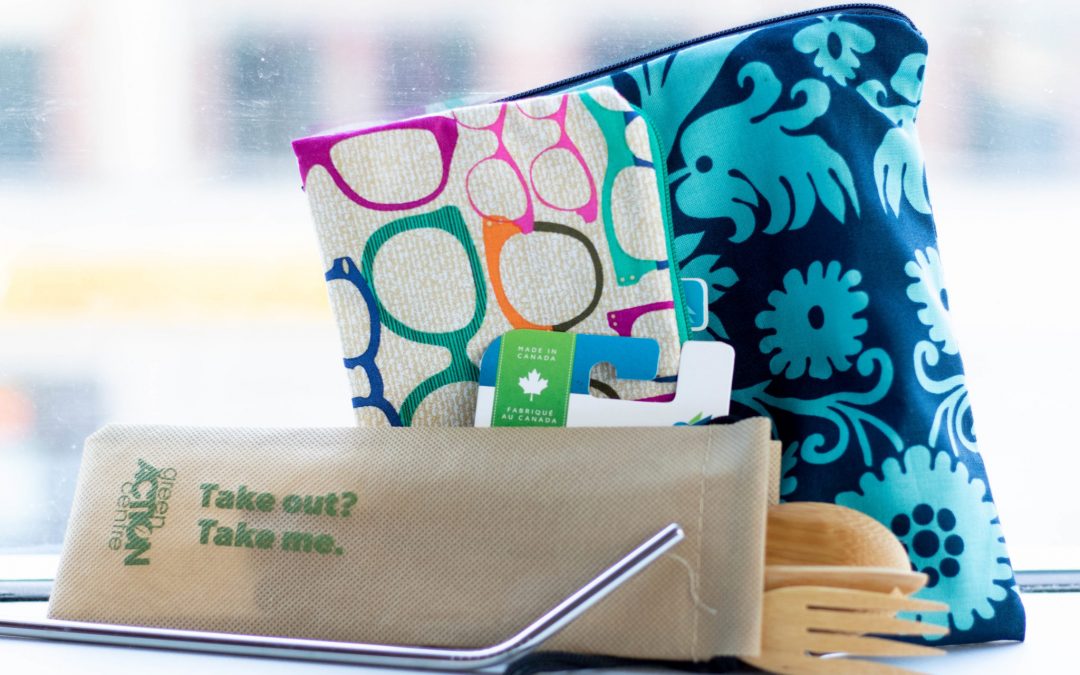Did you know that plastic products are made from non-renewable fossil fuels? And that they can take up to 1000 years to break down? Once they breakdown, they still don’t go away. They simply turn into micro-plastics which then find their way into our water systems and soil.
This means that your single-use shopping bag, your single-use sandwich bag and your plastic toothbrush will outlive you.
Ready to cut down the single use plastics in your life?
10 ways to reduce plastic:
- Carry a reusable straw with you
- Carry a set of reusable cutlery with you
- Bring your own shopping bag with you to the grocery store
- Shop at bulk stores using your own refillable container
- Use a reusable produce bag rather than the plastic ones provided at grocery stores
- Switch from a plastic toothbrush to a bamboo toothbrush
- Bring your own reusable mug/water bottle with you
- DIY! Make your own household products or get your household product containers refilled
- Start using a shampoo bar rather than a bottle of shampoo (and soap bars rather than body wash)
- Switch to reusable sandwich bags and beeswax wrap from plastic bags and plastic wrap




A few more…
11. Talk to the manager at your favourite stores about how their system could reduce the single use plastic waste they force on consumers (or at very least facilitate and incentivize rather than punish individual efforts to avoid taking home unnecessary plastic).
12. Sign a petition to lobby governments and/or corporations to reduce the incidence of single use plastics and to make biodegradable packaging options more affordable and available.
13. Wash and retain all the plastic you do accumulate during the month to sensitize yourself to the amount of waste that runs through your household (much of it despite your best efforts! See points 11 and 12!).
Sidenote:
When you partake of biodegradable single-use containers at food establishments, ask where to dispose of it for compost. (When biodegrables go to the landfill, they produce methane gas rather than breaking down properly into organic material.)
Toilet train your kitty and stop hauling plastic pails full of kitty litter scraped from open pit mines.
All for creative solutions!
Toilet training kitties is, interestingly, something to be cautious about! I’m not certain about Winnipeg, but in many cities, the water treatment process is insufficient to kill the pathogens carried in many cat’s excrement (e.g. toxoplasmosis). Additionally, this adds more sludge to be processed out of our water – if we miss any, it can contribute to algal blooms and poor health of our waterways.
We’ve got a great blog on green pet ownership: https://greenactioncentre.ca/reduce-your-waste/eco-friendly-tips-for-pet-owners/! Using alternative materials for kitty litter is another good option to reduce your impact (plus, less cat-training…)
I am experimenting with using compost in place of litter in the box. It is a hit with some cats! It is light in weight and free! I keep the used compost away from my other yard waste compost and once it has matured I will use it on flowerbeds rather than the vegetable garden – just to be safe.
Where can I find information on solutions for handling pet waste without using plastic?
There are reusable dog waste bag options out there if that’s something you’re comfortable with. The waste collected in these bags can be flushed down your toilet.
We’re continually trying to find more eco-friendly pet care options, so if you have any please don’t hesitate to send them our way! Right now our main resource for pet-owners is our “Eco-Friendly Tips for Pet Owners” blog post here: https://greenactioncentre.ca/reduce-your-waste/eco-friendly-tips-for-pet-owners/
Other options include things like “pooper scoopers”, which don’t involve touching dog waste at all, and even composting it using a digester! If you have a cat, you could try using sturdy paper bags, or re-using plastic bread bags (or toilet paper wrappers etc) to collect the litter. For small animal litter, you can compost it straight in your backyard composter, add it to your Compost Winnipeg collection, or collect it for disposal in a paper bag as it doesn’t tend to be too heavy 🙂